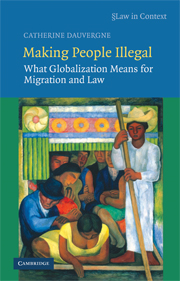Book contents
- Frontmatter
- Contents
- Acknowledgments
- Publication acknowledgments
- 1 Introduction
- 2 On being illegal
- 3 Migration in the globalization script
- 4 Making asylum illegal
- 5 Trafficking in hegemony
- 6 The less brave new world
- 7 Citizenship unhinged
- 8 Myths and Giants: The influence of the European Union and the United States
- 9 Sovereignty and the rule of law in global times
- Bibliography
- Index
- The Law in Context Series
- References
6 - The less brave new world
Published online by Cambridge University Press: 05 June 2012
- Frontmatter
- Contents
- Acknowledgments
- Publication acknowledgments
- 1 Introduction
- 2 On being illegal
- 3 Migration in the globalization script
- 4 Making asylum illegal
- 5 Trafficking in hegemony
- 6 The less brave new world
- 7 Citizenship unhinged
- 8 Myths and Giants: The influence of the European Union and the United States
- 9 Sovereignty and the rule of law in global times
- Bibliography
- Index
- The Law in Context Series
- References
Summary
I started writing this chapter in July 2005 as the forensic sifting following the first coordinated bombing of London's public transit system was beginning. Within days, the investigators had discovered that the suicide bombers had been “homegrown” Britons, citizens, full members of the society they had attacked. Three of the four had been born in the United Kingdom, and all had grown up there. This detail was repeated in news reports, even when the report was clearly focused not on place of birth as a potential determinant for terrorist predilection, but as a detail that somehow had relevance nonetheless. This news, presented as “shocking,” was quickly followed by a story originally carried by the New York Times, but soon syndicated to the corners of the globe, arguing that Britain had allowed itself to become a haven for Muslim extremists and that the attacks were a complicated consequence of having been “too tolerant.” Later it emerged that at least one of the bombers had trained in Pakistan. These events, and this coverage of them, encapsulate the new notes in the migration law – security fugue. They point to diverse aspects of the urgency that security issues have taken on for those concerned with migration, and to the reasons that security, a marginal concern at most in a statistical panoply of migration, now clamors for attention at the center of the discursive stage.
- Type
- Chapter
- Information
- Making People IllegalWhat Globalization Means for Migration and Law, pp. 93 - 118Publisher: Cambridge University PressPrint publication year: 2008

